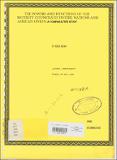| dc.contributor.author | Alemu, Nigus | |
| dc.coverage.spatial | Ethiopia | en |
| dc.date.accessioned | 2015-09-11T13:45:57Z | |
| dc.date.available | 2015-09-11T13:45:57Z | |
| dc.date.issued | 2006-12 | |
| dc.identifier.citation | Alemu, N. (2006) The Powers and Functions of the Security Councils of United Nations and African Union: a Comparative Study. Jimma University 91. Jimma: Jimma University. | en |
| dc.identifier.uri | https://opendocs.ids.ac.uk/opendocs/handle/20.500.12413/6955 | |
| dc.description.abstract | Abstract
People all over the world being the victims of the two wars, have realize
that it is a necessity to establish an international organization to maintain future
international peace. This conviction of peace laving states resulted in establishing
the United Nations, which is now a nearly universal organization, on October 24,
1945. The United Nations Organization is thus an organizing of nations, evolved
as a result of the failure of the Leagues of Nations to function in accordance with
its purposes, which works for world peace and security and the betterment of
humanity. | en |
| dc.description.sponsorship | Jimma University | en |
| dc.language.iso | en | en |
| dc.rights.uri | http://creativecommons.org/licenses/by-nc-nd/3.0/ | en |
| dc.subject | Governance | en |
| dc.title | The Powers and Functions of the Security Councils of United Nations and African Union: a Comparative Study | en |
| dc.type | Thesis | en |
| dc.rights.holder | Jimma University | en |


